I can remember being asked once to draw heaven in a Bible school class. I drew a picture of someone climbing up a hill and then sliding down only to begin again. My thought was that the greatest pleasure in life was achieving something (I suspect the thought was more in Bible school age language) and so heaven must be the continued effort without it really mattering if you got anywhere or not.
Only later did I hear about the the Greek myth of King Sisyphus who for eternity was required to push a boulder up a hill in tartarus, the hellish part of the Greek's underworld, only to see it roll down again.
My childhood drawing of heaven looked a lot like the Greek's conception of hell. Back to the drawing board.
From childhood sermons I had heard of a hell of fire and brimstone. Later I read Jonathan Edward's sermon, "Sinners in the hands of an angry God:"
The God that holds you over the pit of hell, much as one holds a spider, or some loathsome insect over the fire, abhors you, and is dreadfully provoked: his wrath towards you burns like fire; he looks upon you as worthy of nothing else, but to be cast into the fire; he is of purer eyes than to bear to have you in his sight; you are ten thousand times more abominable in his eyes, than the most hateful venomous serpent is in ours.I wasn't sure I could swallow that idea of God or hell, but the language still holds me spellbound.
When I read Dante's Inferno in college, my imagination of the sophistication of hell increased. I was particularly struck by the varieties of hell for different types of sinners. Also, I had never thought of Satan in a frozen center, so that was fun. A couple of years ago, I read a murder mystery, The Dante Club, by Mathew Pearl. I enjoyed it and also enjoyed revisiting various types of Dante's punishments. It features Longfellow, who by the way, wrote some of my favorite translations of Spanish literature.
Milton's hell seemed like a great adventure for me. I read Paradise Lost in college. I was of an age when the adventure of being in hell plotting a revenge against heaven was much more appealing to me than Milton's paradise. I agreed with the proposition: To reign is worth ambition though in Hell: Better to reign in Hell, then serve in Heav'n.
I also read about Sartre's hell being other people in "No Exit." It did not hold me spellbound.
For some reason, I have been fascinated by the contemplation of hell. It makes me feel better, but I am not sure why. I know my conception of hell is simple, simple, simple. Maybe, as I approach that seventh decade, I should think more deeply about the subject.
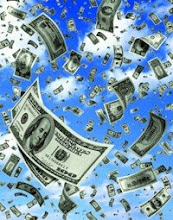
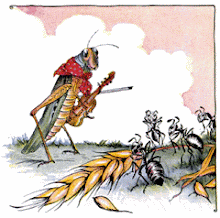
























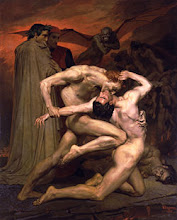_-_Dante_And_Virgil_In_Hell_(1850).jpg)



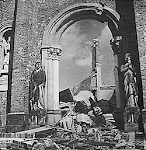











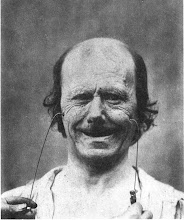



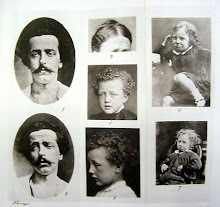






















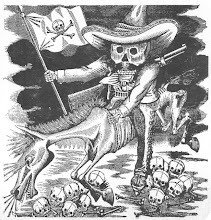












12 comments:
Hell is fear of facing the truth. Sometimes old saying have a way of being correct. "The truth will set you free."
You're already in your sixth decade.
The concept of hell makes some feel better because it helps people believe they will survive their own deaths. I have a hard time wrapping my mind around the concept of non-being as well.
Knowing that sinners will get their just desserts in hell would also be satisfying for many.
I am already well into my sixth decade. I'll edit the post to moving into my seventh decade.
Thanks. I feel much younger now.
ES,
There is evidence that Confucianism held some influence over the development of Bushidō.
The combination of that self-acutalization combined with Zen discipline, leads to a deeper understanding of Bushido.
It is the struggle between doing what your naturally evil tendencies tell you to do and what you train yourself to do.
Hell is when the natural tendencies run unchecked.
K
I've read Dante's Divine Comedy and Milton's Paradise Lost in the last two years.
"In the midway of this of our mortal life/
I found me in a gloom wood astray/
gone from the path direct"
described me to a T just a short 2 years ago.
the image of being forever chased by a pack of female mastiffs kept me alive. Canto XIII - 7th Circle of Hell, 2nd Compartment.
my version of the Divine Comedy had footnotes referencing Paradise Lost.
At the conclusion of Milton's work,
I decided that it was not worth gambling on my station in eternity on my own sense of intelligence.
faith has made me a happy man again,
i feel on the path direct again.
those two books are worth the read.
they've had an influence over the CENTURIES for a reason.
C.
Good point. Haven't read it in...too long.
K
BTW is it Auguste or Austine?
Augustine.
sorry about the spelling error.
was on the phone and typing at the same time.
you guys have too much time on your hands. go have an affair. there's no such thing as hell. it's just something someone made up a long time ago.
Anony of May 7, 2008 8:03,
Well, thank you Mr. Weishaupt.
With that impenetrable logic, you have ended the quest for knowledge.
Much obliged,
Kurgan
There's a difference between a quest for knowledge and a waste of time. sending a telescope to the heavens is search for knowledge. looking to the heavens for a guy with a beard or a dark angel was a bedtime story to explain the then unexplainable. Heaven and hell is merely the running tally in an unedited conscience, assuming we have a conscience, sending us daily updates to help us evolved into better humans so we can die in peace. Otherwise, we're doomed to purgatory with an occasional junket back to earth to fuck with people's minds. Like I said, I'd rather go to Cobbleheads on a Thursday nite and take my chances with a divorcee from across. That's hell.
If God is love, and Hell is eternal seperation from God, then Hell is the absence of love.
Hell isn't seperation from people; it's the inability to love them. I agree with Sartre (that the presence of other people without the requisite love for them)and the Myth of Sisyphus (that striving toward love, if it were impossible, would be hell) more than Dante or Milton.
If Hell is the inability to love other people, then Heaven is love.
Why can't Heaven and Hell be experienced during life? It seems strange that the contraints we place Heaven or Hell-- time and space-- are distictly not-divine. Surely a God who is both eternal and omnipresent wouldn't place such limits on his realms.
Post a Comment